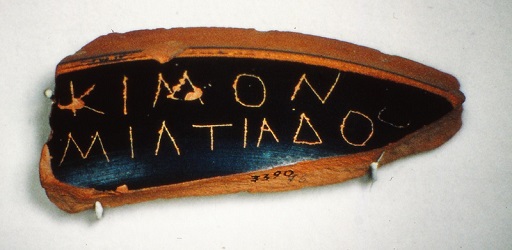5 Patronymics
Let us now look at the use of the genitive case on some ostraka. The ostrakon bearing the name of Cimon, reads:
Κίμων Μιλτιάδο
Cimon [son] of Miltiades
The name of Cimon’s father is Μιλτιάδης, written here as Μιλτιάδο, with the final omicron (ο) representing a sound which later writers would spell as -οu (Μιλτιάδοu). Once again, a small change of spelling carries a significant implication. Greeks would understand this to mean ‘Cimon, [son] of Miltiades’. In this context, the word ‘son’ is not necessary and would have been understood.
The use of the father’s name to refer to Greek males, distinguishing them from others with the same name, was common in public settings. The additional name was known as a ‘patronymic’ (from πατήρ, father and ὄνομα, name). Very occasionally, the mother’s name was used to form a ‘metronymic’ (from μήτηρ, mother).
Patronymics exist in many languages. English examples include: Johnson, Richardson and Robertson. Mc and Mac have a similar force in Scots, as does O’ in Irish.
Activity 4 The grammar of ancestry
a.
Alexander
b.
Philip
The correct answer is b.
Discussion
Φιλίππου has a genitive case ending, which makes Philip the father:
- Alexander, [son] of Philip
If Ἀλέξανδρος Φιλίππου means ‘Alexander, son of Philip’, what would be the meaning of this?
- Ἀλέξανδρος Ἀλεξάνδρου Φιλίππου
Discussion
This means:
- Alexander [son] of Alexander [son] of Philip
This example shows how genitives can be linked in a chain to represent the ancestral line of an individual. Alexander the Great did have a posthumous and short-lived son called Alexander. The figures in this family tree are:
- Ἀλέξανδρος: Alexander IV (323-?310 BCE), son of
- Ἀλεξάνδρου: Alexander the Great (strictly speaking, Alexander III, 356-323 BCE), son of
- Φιλίππου: Philip II (382-336 BCE)

